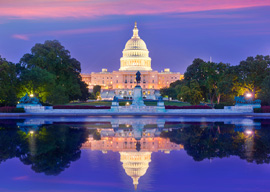
September 08, 2017

Source: Bigstock
A century ago, Congress ceded to the Federal Reserve its right “to coin money (and) regulate the value thereof.” It has yielded to the third branch, the Supreme Court, the power to invent new rights, as in Roe v. Wade. Its power to “regulate commerce with foreign nations” has been assumed by an executive branch that negotiates the trade treaties, leaving Congress to say yea or nay.
Congress alone has the power to declare war. But recent wars have been launched by presidents over Congressional objection, some without consultation. We are close to a second major war in Korea, the first of which, begun in 1950, was never declared by the Congress, but declared by Harry Truman to be a “police action.”
In the age of the internet and cable TV, the White House is seen as a locus of decision and action, while Capitol Hill takes months to move. Watching Congress, the word torpor invariably comes to mind, which one Webster’s Dictionary defines as “a state of mental and motor inactivity with partial or total insensibility.”
Result: In a recent survey, 72 percent of Americans expressed high confidence in the military; 12 percent said the same of Congress
The members of Congress the TV cameras reward with air time are most often mavericks like John McCain, Lindsay Graham and Jeff Flake, who will defy a president the media largely detest.
At the onset of the post-Cold War era, some contended that democracy was the inevitable future of mankind. But autocracy is holding its own. Russia, China, India, Turkey, Egypt come to mind.
If democracy, as Freedom House contends, is in global retreat, one reason may be that, in our new age, legislatures, split into hostile blocs checkmating one another, cannot act with the dispatch impatient peoples now demand of their rulers.
In the days of Henry Clay and Daniel Webster, Congress was a rival to even strong presidents. Those days are long gone.